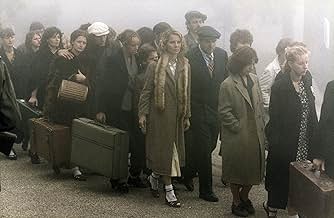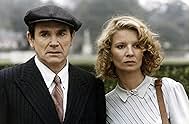IMDb RATING
7.3/10
2.9K
YOUR RATING
The intertwined lives of three generations of musicians and dancers from Russia, Germany, France and the U.S., from before World War II through the war and the Holocaust, to the 1980s.The intertwined lives of three generations of musicians and dancers from Russia, Germany, France and the U.S., from before World War II through the war and the Holocaust, to the 1980s.The intertwined lives of three generations of musicians and dancers from Russia, Germany, France and the U.S., from before World War II through the war and the Holocaust, to the 1980s.
- Awards
- 1 win & 6 nominations total
- Director
- Writer
- All cast & crew
- Production, box office & more at IMDbPro
Storyline
Did you know
- TriviaFrancis Lai: The composer appears as the blind accordion player.
- Goofs(at around 1h 21 mins) The soldiers are playing cards on the train and the game they are playing changes between shots.
- Crazy creditsThe grand majority of the opening credits are spoken by the narrator. The narrator stops after crediting the choreographer. Only the film's production company, title and the name Claude Lelouch appear in writing before the Bolero dance at the opening (when the writing is onscreen, the orchestra is warming up). Also, a quote by Willa Cather appears at the very beginning.
- Alternate versionsPresented on French television in a 6 hours version quite clearer then the shortened American release. Richard Bohringer and Fanny Ardant's characters, for example, are better developed.
- ConnectionsEdited into Les uns et les autres (1981)
- SoundtracksFolies Bergère
Music by Francis Lai
Lyrics by Boris Bergman
Performed by Catherine Russell and Ginette Garcin
Featured review
Well, I'm obviously not alone in saying this is the best, the greatest, the finest movie, etc. So what's with the rating? Again, as in many cases of movies with few votes, a small group skews the score to a ridiculous level. I saw this masterpiece in Paris when it came out in the early 1980's, and went back to see it the nest day. It was too much exquisite detail to take in during one sole session. The development of the characters, interwoven into the fabric of tragedy that was the war, the haunting Bolero by Ravel. Devastingly beautiful touching, and grand. Since this film, Lelouche (A MAN AND A WOMAN, LES MISERABLES (1994) has made a few films touching on his autobiographical experiences as a young Jew, during the Holocaust. This movie was made before there were dozens of them to compare to, like Lelouche's own perhaps just as good LES MIS... with Jean-Paul Belmondo. Having lived in France, I know there are many cinephiles who just outright hate Lelouche. These feelings, as I have experienced them, are thinly-veiled anti-semitic feelings. Say, it may be an "artsy" way of saying I'm an anti-semite: J'aime pas Lelouche. I think this is why this movie is undeservedly ranked so low in this base. I came across, and voted on it a while back, precisely because the rating shocked me so. As I went through the comments though today, I was happy to see I was not alone, and thought I would throw my "ten francs worth" in. I want to buy it for my collection.
- How long is Bolero?Powered by Alexa
Details
- Release date
- Country of origin
- Official sites
- Languages
- Also known as
- Bolero: Dance of Life
- Filming locations
- Garancières, Yvelines, France(Railway crossing and station scene)
- Production companies
- See more company credits at IMDbPro
- Runtime2 hours 53 minutes
- Color
- Aspect ratio
- 2.35 : 1
Contribute to this page
Suggest an edit or add missing content

































